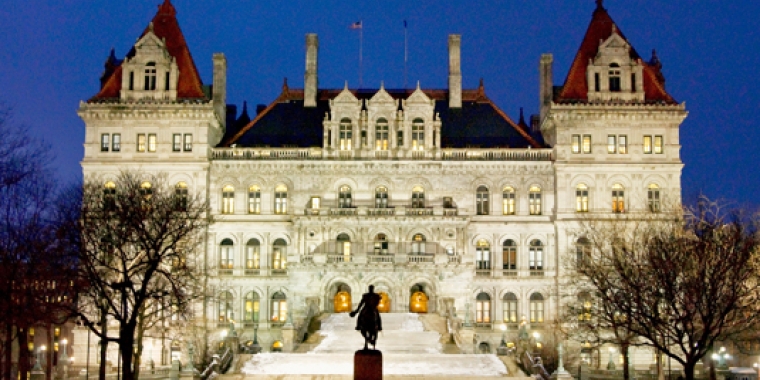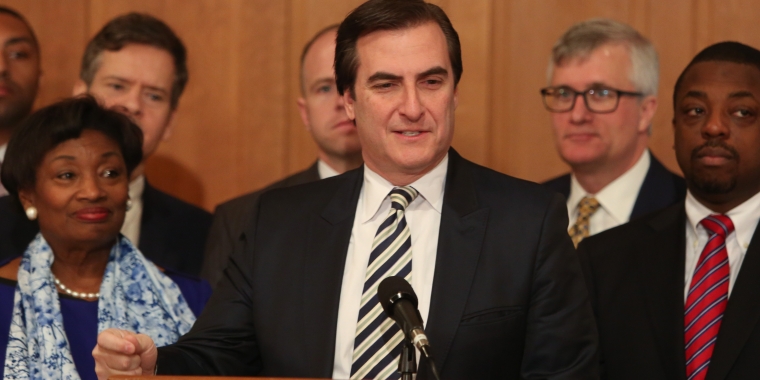
City Limits: Officials, Housing Advocates Call for Better Tenant Protections as COVID Crisis Drags On

Housing advocates and elected officials say Gov. Andrew Cuomo should support legislation for a stronger eviction moratorium and immediate financial assistance for tenants impacted by the COVID-19 crisis in the next legislative session, in light of the unpredictable economic crisis the city will face in the coming years.
There are two Senate bills, both currently in the Senate’s Housing, Construction And Community Development Committee, that aim to address the plight of renters during the pandemic.
One bill, S8667 introduced by Brooklyn Sen. Zellnor Myrie, would prohibit the enforcement of an eviction of any residential or commercial tenant and prevent a court from filing any papers related to a judgment of possession, a court order that determines who is entitled to a property, for one year after New York’s state of emergency ends. It would also prevent the foreclosure of any residential or commercial property for the same period.
At the beginning of the Coronavirus pandemic, Gov. Cuomo announced a blanket eviction and foreclosure moratorium. In May, the state revised the eviction moratorium and required the tenant to provide proof of economic loss due to the pandemic which ends on August 20th this year. Myrie’s bill would require no such proof of hardship.
Another bill, S7628 sponsored by Brooklyn and Manhattan state Sen. Brian Kavanagh, would establish a housing access voucher program, under the purview of the state’s Division of Housing and Community Renewal, to provide housing vouchers for eligible individuals and families who are homeless, or who face an imminent loss of housing. The Housing Trust Fund Corporation would oversee the program, and state and local public housing agencies would administer it.
“The most important thing that we’re looking at right now is making sure people have food to eat and shelter over their head and health care. If you have those basic three things then we can struggle and survive through this, but obviously when it comes to rent and mortgages, we need relief because whatever the new normal will be, it won’t be the new normal until approximately two years from now,” State Sen. Robert Jackson said during an online press conference Friday.
“We don’t know what it’s going to look like, but we need to fight to make sure from a housing point of view, that it will meet the needs of the majority of the tenants, not only in New York City, but New York State.”
The press conference came days after the de Blasio administration said 100 homeless individuals had died in the shelter system due to COVID-19. Housing advocates are pushing elected officials and the governor to enact these new bills when the state legislature reconvenes later this month.
The state’s current eviction moratorium is in effect until August 20. Additionally, last month Cuomo signed the Tenant Safe Harbor Act, which prevents evictions if a tenant is facing a financial impact due to the novel Coronavirus pandemic. Housing advocates, however, say the act does not go far enough to protect vulnerable New Yorkers, such as the undocumented immigrant tenant population. Friday’s press conference was also attended by State Senators Michael Gianaris and Gustavo Rivera, and State Assemblymembers Karines Reyes, Yuh-line Niou, Harvey Epstein, Linda Rosenthal and Brian Barnwell.
Despite the passing of Emergency Rental Relief Act in June, which will create a new program through the state Division of Housing and Community Renewal to pay $100 million in rent for severely rent-burdened New Yorkers, there have been no guidelines and no forms created yet for eligible residents to apply for the program, according to Jackson and Barnwell. Advocates called the bill’s financing inadequate.
“So even when we pass laws, the governor controls the agencies. The governor is not effectively using his power or overseeing the agencies and holding them accountable to get these vouchers going. What are we waiting for here? It’s ridiculous,” said Barnwell.
Across the country, many housing advocates, tenants, property owners and elected officials are facing the same circumstances. The federal CARES act, through which unemployment recipients receive an additional $600 dollars a week — funding which housing advocates previously told City Limits has helped tenants stay in their homes — expires on July 31st. According to a Politico report, Republican Majority Leader and U.S. Senate leader Mitch McConnell has no plans to extend the additional financial assistance for those on unemployment.
In June, the national unemployment rate was 11.1 percent. For the week ending July 4 initial claims for Unemployment Insurance (UI) in New York state (which includes out-of-state residents), increased by 277 percent compared to the year before, according to the state’s Department of Labor.
U.S Sen. Elizabeth Warren wrote and introduced legislation, called Protecting Renters from Evictions and Fees Act, which would create a national eviction moratorium. The bill is backed by U.S. Sen. Charles Schumer as well as U.S. Reps. Jesús “Chuy” García and Barbara Lee. The bill would prevent renters from losing their housing if they faced economic hardship due to the crisis and need additional time to make their housing payments. The bill also prohibits additional fees, fines and other charges due to nonpayment of rent. It would extend the current federal eviction moratorium until March 27, 2021.
Gianaris painted a bleak picture of what the housing crisis could look like if adequate legislation does not pass in the upcoming legislative session, and if the state continues to rely on the federal government to “come and save the day.”
“I don’t think the state has risen to the occasion. And unfortunately I think it’s going to be the crisis, smacking us in the face, as opposed to looking down the road and predicting it’s going to come to what we tried to do for the last couple of months, but once this eviction moratorium expires, once a lot of the assistance that’s been propping people up, goes away. You’re going to see mass evictions, clogging up the court system, kicking people out to the curb, making the problem with the houseless, even worse,” said Gianaris. “Because we are dealing with the health crisis, yes. We are dealing with an economic crisis, yes. But we are on the brink of a housing crisis that’s going to smack us all in the face and be something that we’re going to see right before us on the streets of our cities, all across this country.”\




